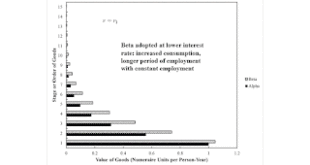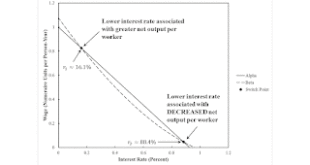Table 1: Lower Rate of Profits around a Switch Point Tradional Marginalist Story'Perverse' Marginalist Story Traditional Austrian StoryGreater net output per workerSmaller net output per worker More roundabout techniqueMore roundabout technique Switch pt. in region 2, 1st in region 52nd switch point in region 3, 2nd in region 6 'Perverse' Austrian StoryGreater net output per workerSmaller net output per worker Less roundabout techniqueLess roundabout technique 1st in region 3, 1st and 3rd in...
Read More »A Robinsade For Austrian Capital Theory
I take the following long quote from Bohm-Bawerk. "The entire sum of originary productive forces at Crusoe’s disposal … is a day’s labor which we shall assume to be a 10-hour workday… Let us assume that the fruit harvest [is] enough to enable our castaway to gather the subsistence minimum in nine hours a day, and enough in 10 hours to furnish him with adequate sustenance for complete health and vigor... Crusoe now has a choice between two lines of conduct. One alternative is ... to...
Read More »Another Hayekian Triangle Not Supporting The Austrian School
Figure 1: Hayekian Triangles for The Two Techniques1.0 Introduction This post is a variation on this one. 2.0 Technology and Net Output Suppose technology is as characterized by the coefficients of production in Table 1. All techniques are characterized by single production, no fixed capital, and no joint production. In the Alpha technique, the first corn-producing process is operated. The second corn-producing process is operated in the Beta technique. The ale-producing process is...
Read More »Roger Garrison On The Inadequacy Of Hayekian Triangles
Hayek introduced his triangles in his lectures for his book Prices and Production. The first edition was in 1931 and the second in 1935. He attempted a more general treatment of capital theory in his 1941 book, The Pure Theory of Capital. I want to claim that Hayek knew that he could not draw his triangles under these more general assumptions. And that he knew that capital theory needed more development than he was able to give. Jack Birner knows this, although I do not know a reference...
Read More »The Production Of Commodities And The Structure Of Production: An Example
Figure 1: Wage Curves for the Two Techniques1.0 Introduction Economists following the Austrian school often represent the structure of production with Hayekian triangles (Hayek 1931, Rothbard 1962, Skousen 1990, Garrison 2001, Machaj 2017). Typically, goods of the highest order are produced with unaided labor or other unproduced original resources. (Fillieule (2007), in which a Hayekian triangle is constructed with an infinite stream of unproduced inputs, is an exception.) Rarely, is a...
Read More »The Production Of Commodities And The Structure Of Production
Many of my examples illustrate simple structures of production for models in which commodities are produced with commodities. Economists following the Austrian school often illustrate the structure of production with Hayekian triangles. Accordingly, this post illustrates a Hayekian triangle with a model in which commodities are produced out of commodities. I consider the case in which only circulating capital exists. This post is a rewrite of this one. The following are taken as given for...
Read More »Maynard Keynes Making Fun Of The Austrian School
This is for my commonplace book. "It is true that some lengthy or roundabout processes are physically efficient. But so are some short processes. Lengthy processes are not physically efficient because they are long. Some, probably most, lengthy processes would be physically very inefficient, for there are such things as spoiling or wasting with time. With a given labour force there is a definite limit to the quantity of labour embodied in roundabout processes which can be used to...
Read More »Austrian And Marginalist Capital Theory Without Foundation: A Summary
A mistaken theory claims prices convey information about relative scarcities. Friedrich Hayek uses an example of tin. According to this theory, a higher wage incentivizes investments in less labor-intensive techniques and to shifting production towards less labor-intensive commodities. Likewise, a lower interest rate incentivizes investments toward more capital-intensive techniques and to shifting production towards more capital-intensive commodities. A number of attempts have been made...
Read More »Ludwig Von Mises Being Wrong On Economic Calculation
I have demonstrated that Von Mises fails to identify problems with central planning. This post merely documents Von Mises being mistaken. He erroneously says that an economic decision cannot be made over alternative methods of producing a given good, without market prices for capital goods and resources. "The director wants to build a house. Now, there are many methods that can be resorted to. Each of them offers, from the point of view of the director, certain advantages and...
Read More »Von Mises Wrong On Economic Calculation (Update)
1.0 Introduction This post is an update, based on suggestions from a user on reddit. I have explained this before. Suppose one insists socialism requires central planning. In his 1920 paper, 'Economic calculation in the socialist commonwealth', Ludwig Von Mises claims that a central planner requires prices for capital goods and unproduced resources to successfully plan an economy. The claim that central planning is impossible without market prices is supposed to be a matter of scientific...
Read More » Heterodox
Heterodox


